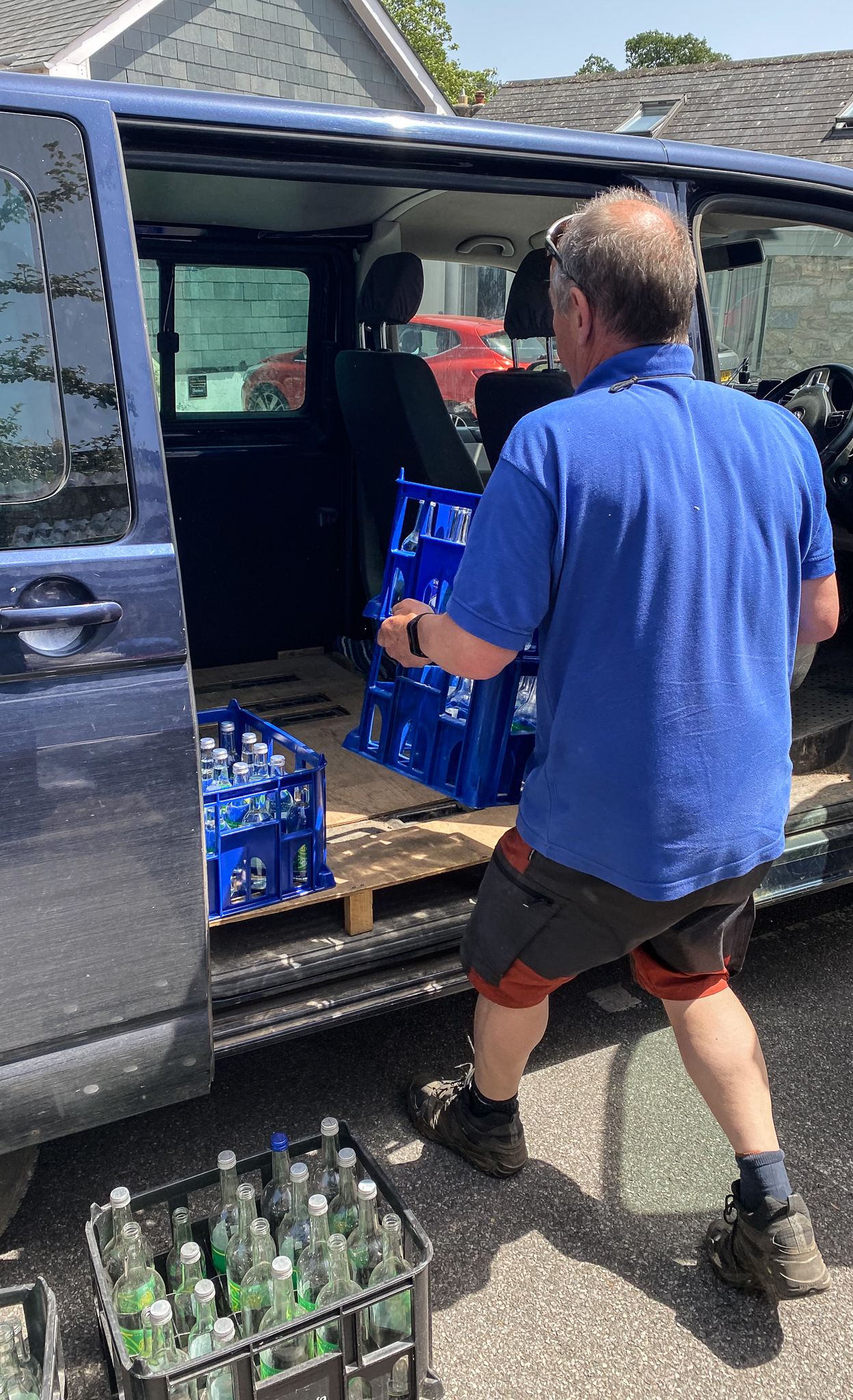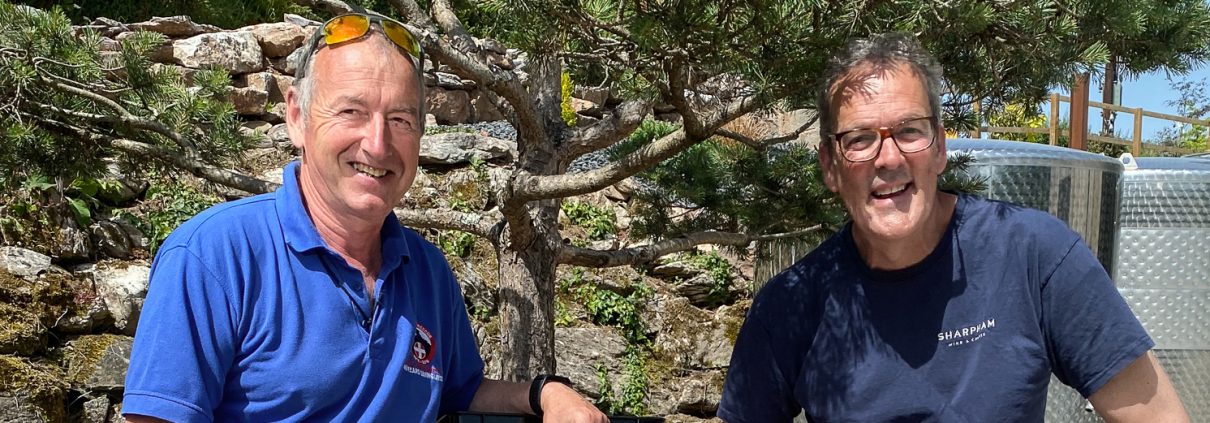A Day in the life of Neil
Amid a heatwave, Neil invited journalist, Martin Hesp, to join him for a day and so they spent one of the hottest days of the year delivering Devonia Spring Water around South Devon.
In case you missed it, here’s Martin’s article from the Western Morning News:
What is one of the most useful jobs you could do in a heatwave? There’s quite a list, including lifeguards, ice-cream sellers and air-conditioning engineers — but my vote would go to the person delivering lovely, fresh, cooling, spring water.
Maybe I am biased, because that is exactly what I was doing recently in the company of Neil Graham, who owns the South Hams based company, Devonia Water. And phew, wasn’t it hot as we travelled around the busy coastal area and up onto Dartmoor!
At one point between a couple of delivery stops, a newsreader on the radio was reporting on the latest research which was linking the actions of humankind with this summer’s heatwaves and rising temperatures – and in many ways the news resonated with the man who was actually delivering the Devon spring-water… Because Neil believes his company has developed one of the many kinds of eco-friendly business models which could help ameliorate global warming.
“You must remember, even if you buy drinks or liquids in glass bottles so that they can be recycled, it is a process which requires a huge amount of energy,” Neil told me as he loaded yet another sack truck with crates of his company’s return-able bottles. “An American study showed that you use 94 percent less energy washing a bottle compared to recycling glass.
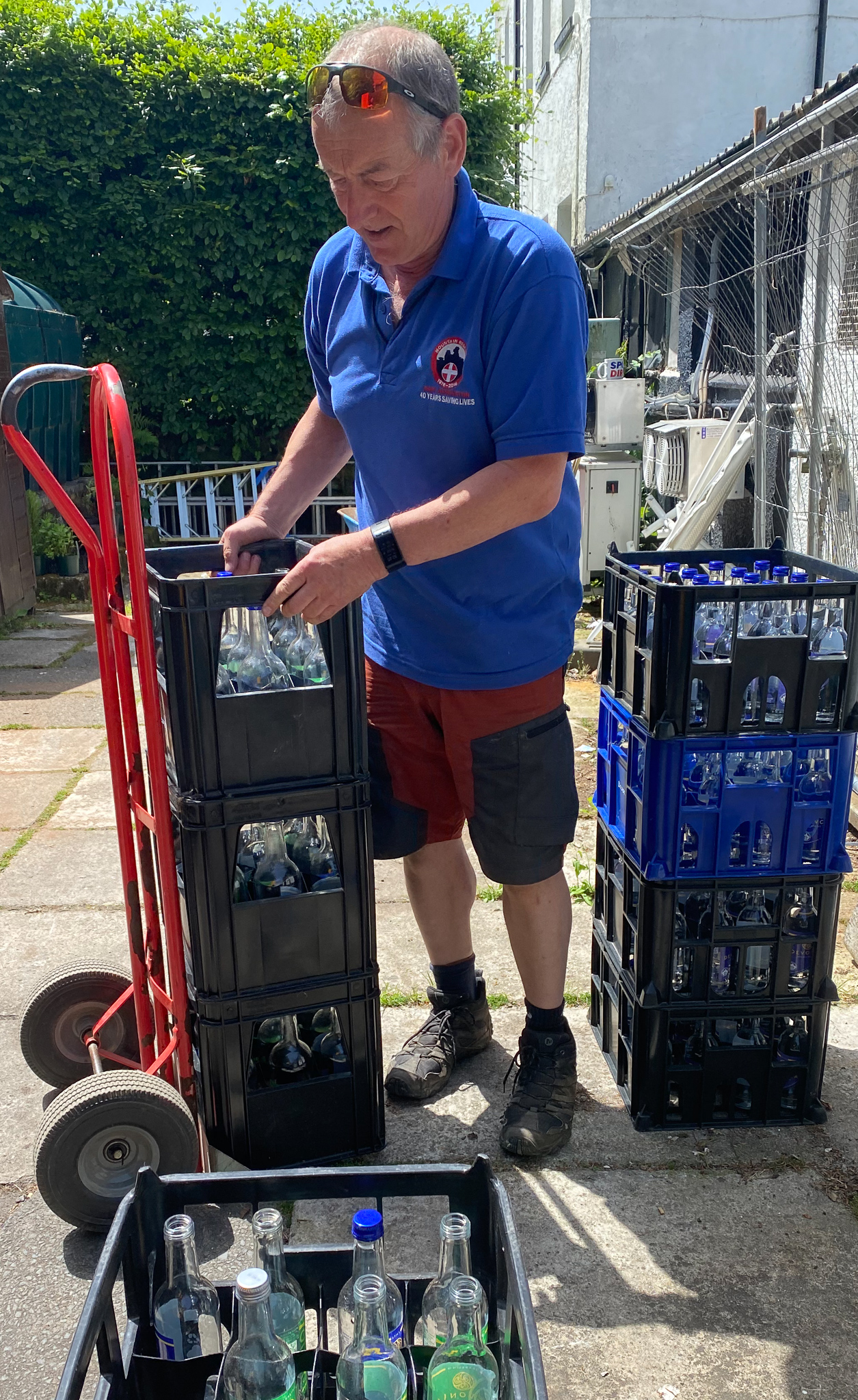
“Everyone thinks putting something in a recycling bin is really good, but that recycled bottle has to travel an awful long way to reach the industrial centres where it can be recycled – and then there’s a hell of a lot of energy required to melt it down and reform it back into something useful. It equates to using something like 16 times more energy than simply washing and reusing a bottle.
“The simple re-use of a bottle is a win-win-situation. There is very little point in sending a useful readymade object like a glass bottle back for recycling when it can simply be used again. And, by the way, very little of the recycled material actually goes back into making bottles – it goes into things like glass-fibre or even road surfaces.”
Neil says Devonia Water has reused around 2.5 million bottles in the 18 years he’s been running the business – a statistic which means it must have saved one hell of a lot of fossil fuels from adding to the world’s carbon problem. It means some 300,000 kilograms of glass has been saved from either being expensively recycled or, worse, bunged in a landfill. Which makes it all the more extraordinary that Devonia Water is the only company of its kind in Britain with a business model based on the concept of reusing bottles time and again. There is one other business working along the same lines, but on a much smaller basis.
“There are two basic elements involved with the trend which is seeing an increasing demand for spring-water – what’s inside the bottle, and the bottle itself,” Neil went on, mopping sweat from his brow as we began unloading crates for the first customer of the day in temperatures climbing towards 30 degrees.
He passed me a bottle of Devonia’s popular sparkling water and added: “Every drop of the pure h20 we take from our ancient spring located near the South Hams coast is delivered to the consumer in a glass bottle like this – which will be collected from this customer to be used again. And again and again.”
Last year alone, by supplying hotels, pubs, cafes, restaurants, special events and private customers across the South Hams and Dartmoor areas, Devonia Water reused no fewer than 211,644 bottles, saving the energy required to recycle nearly 11,560 kilos of glass.
“We’ve got a large number of customers all over South Devon who love the fact that we operate a delivery system with multi-use bottles. It’s like an infinity-circle – these bottles go round and round and round. About 87 per cent of our bottles will be recycled and go round again – and that number has risen from about 79 percent over the past couple of years. People are becoming more and more aware of the damage they can do to the environment by just throwing packaging away.”
At this point we stopped at our second port of call, the Circa restaurant at the new Sandridge Barton Winery in the hills above the River Dart, where I happened to bump into CEO and head wine-maker Duncan Schwab… “We can make wonderful wine here – but it is fantastic for us to have a good supply of local bottled water because it is exactly the sort of thing guests at our new restaurant would expect to see,” commented Duncan.
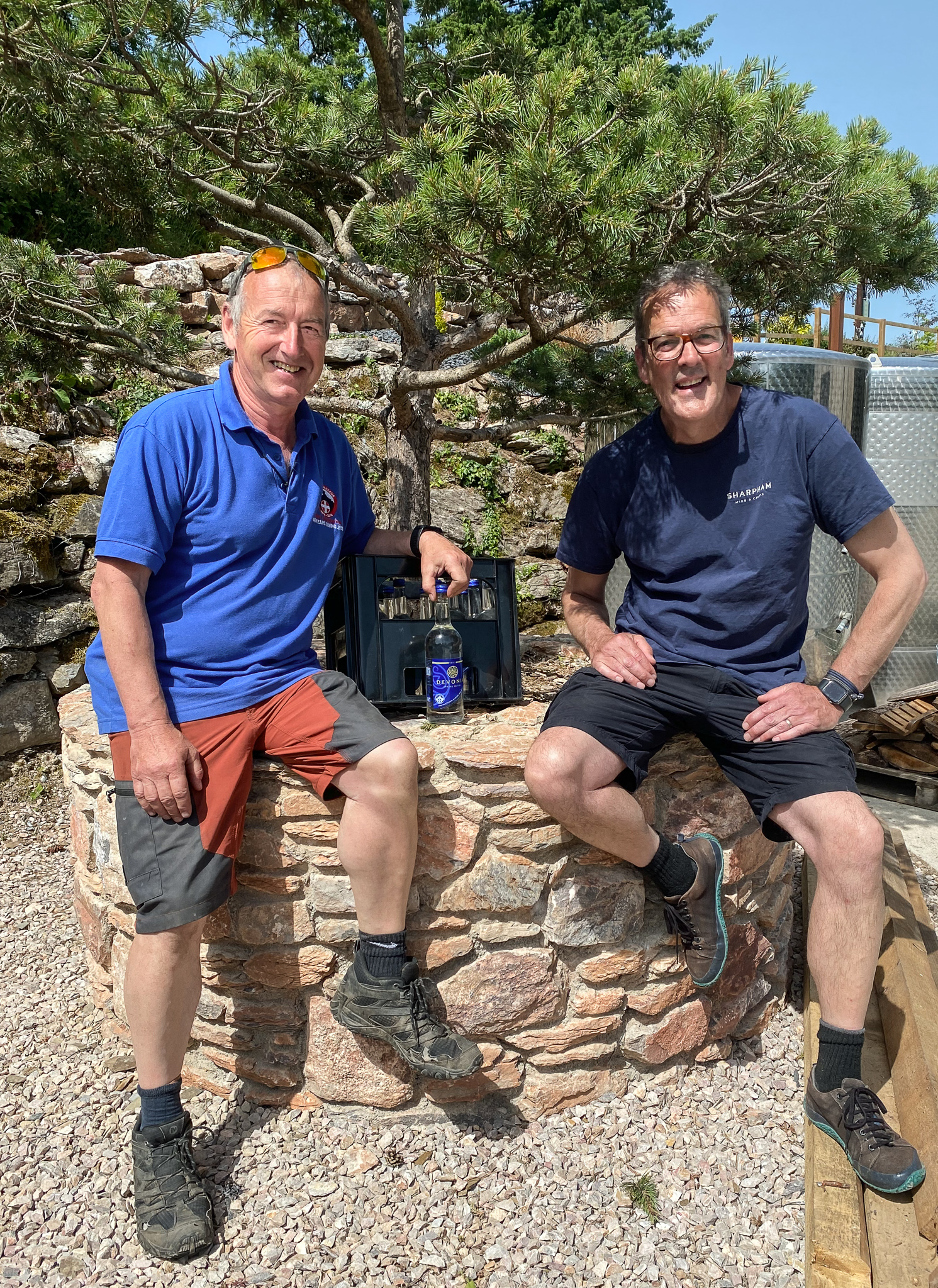
Neil Graham with Duncan Schwab, CEO and Head Winemaker of Sandridge Barton
Later, Rob Weeks, head chef at Circa which runs the exciting new restaurant area, was also telling me about how his businesses places huge importance on sustainability and ultra-local sourcing… “We are being very ambitious at Sandridge Barton in that we are aiming to be hyper local in everything we do – within a year or so we should be entirely reliant on suppliers operating just a few miles from the restaurant.”
As the crow flies the Devonia Water spring – located in the coastal hills near Beeson – is just a dozen miles south of the grapevines. The water source and bottling plant are situated just a mile from Beesands and The Cricket Inn – an award-winning establishment which, of course, is yet another customer. Indeed, I was to notice that a great many well known watering-holes are enthusiastic supporters of Devonia Water.
It was just under 20 years ago that Neil bought what was a much smaller spring-water business from a local father-and-son team. The ex-Royal Marine immediately began investing in the operation, improving the bottle-washing facilities and so on…
“Records show that the spring has been in use for more than 400 years,” said Neil as we continued on the delivery-round. “I understand Captain Cook was friendly with the local landlord – and possibly his ship The Bounty moored off the coast and even filled up with our water before they went off to discover Australia!
“The spring was capped and secured by the people who owned the land about 50 years ago which is when they started a small water-bottling business. I have been told the water has a very soft taste,” he added. “All waters have different mineral contents – they pass through different rocks and pick up different minerals.
“Which brings me to another point… If you’ve come down to beautiful Devon on holiday, why would you want to have your bottled water coming from Italy, Scotland or France? It’s local and people want to see local stuff. There’s no mileage or Co2 being wasted dragging stuff from other places.
“Yes, some people are a bit lazy when it comes to putting a bottle back in a crate to be taken away,” he added. “But I find the younger generation is really behind all this. It’s their world and they don’t want to see it being messed up by people throwing really good containers away.”
Neil talked about the old Corona bottle system, which readers of a certain age will remember. Indeed, as kids many of us relied on taking empty bottles of pop back to the shop so we could earn a few pence pocket money. Everyone seemed to accept the return-able bottle as a fact of life back then, so why – asks Neil – can’t we have more of it today?
By now our journey had taken us to the slopes of Dartmoor on our way to a number of leading hostelries across the moors – which gave Neil a chance to talk about one of his favourite subjects… Namely, the Ashburton team of Dartmoor Search and Rescue, where Neil has been a keen and active member for many years. It is a charitable organisation, funded totally by donations, and Devonia Water does all it can to raise money in sponsorship.
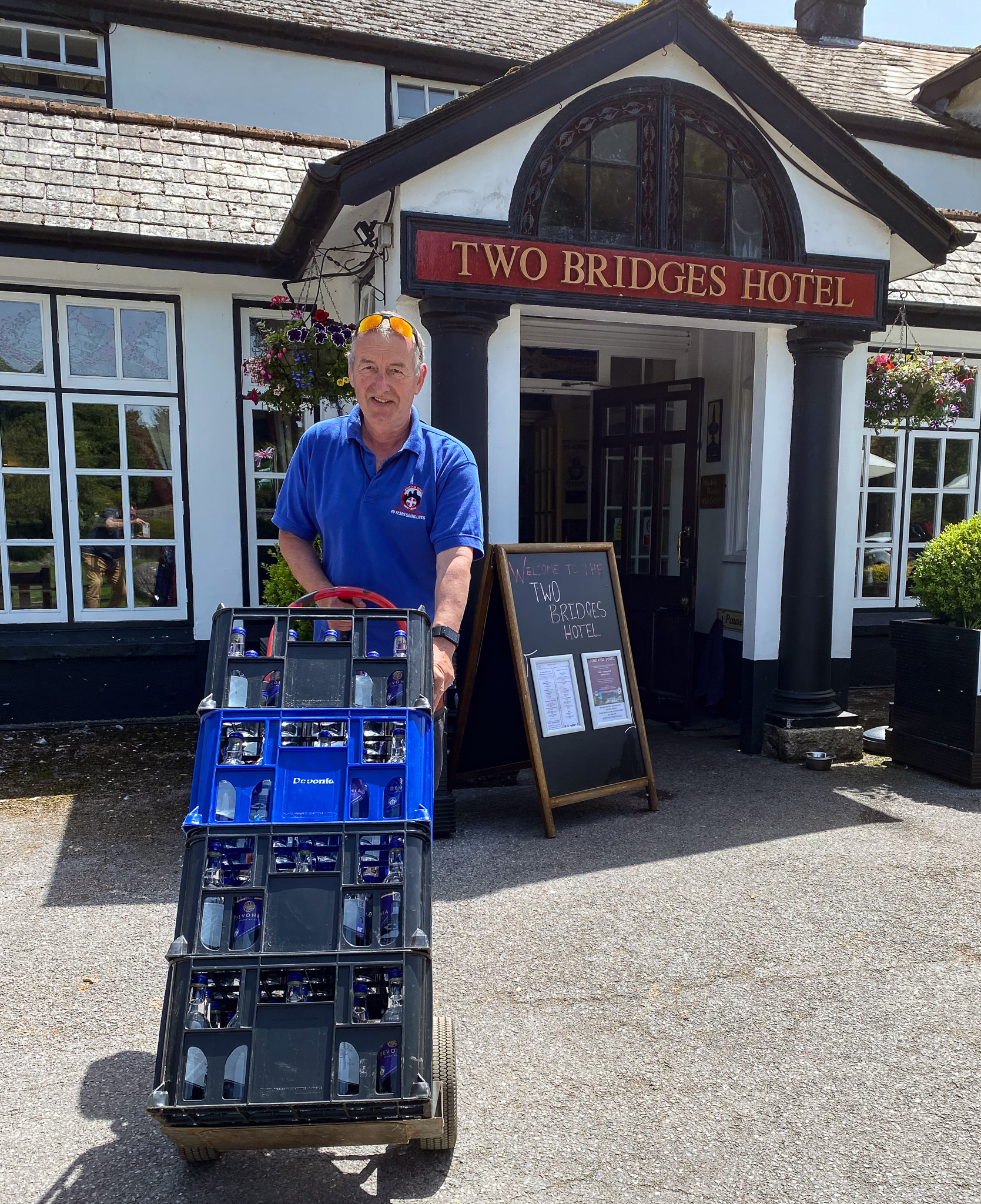
“I absolutely love coming up here, but the moors can be a treacherous place,” he said as we headed for the Two Bridges Hotel.
As the midday temperature was reaching 30 degrees, I agreed – muttering something about the importance of taking water with you when you’re hiking on the moors. Not surprisingly, it was an observation which won the resounding approval of a man who has not only been delivering Devon’s sweetest water for the past 20 years, but returning week after week to collect the empties.
